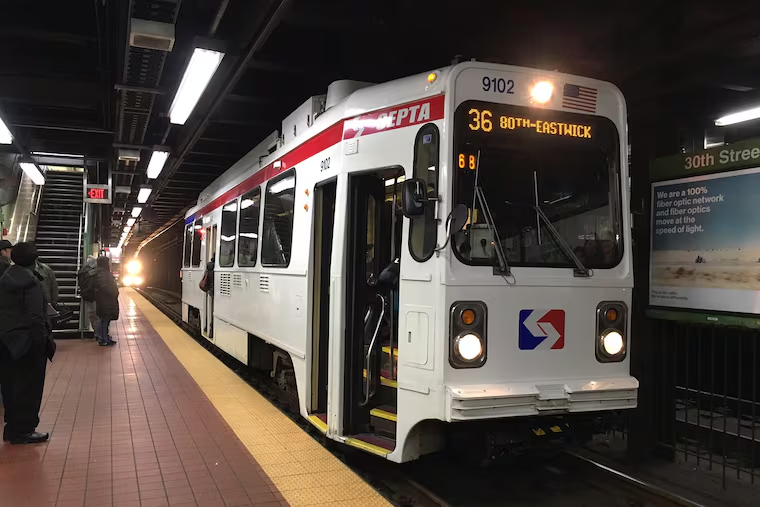SEPTA says it will forge ahead with trolley modernization in ambitious capital budget
Amazon plans to put a warehouse at 6901 Elmwood Ave. in Southwest Philadelphia, which was to be the site of a new SEPTA trolley barn.

SEPTA proposes spending $203 million over the next 12 years to modernize its trolley system, a project recently dealt a setback when Amazon snagged a Southwest Philadelphia property the transit agency was trying to buy for the new fleet.
The commitment came in the authority’s $689 million capital budget for the next fiscal year and its long-term $7.4 billion capital program for service upgrades and infrastructure repairs, released Monday.
It would spend $30 million on the trolley project in fiscal year 2022, which begins July 1 and runs through June 30 next year.
“We are moving forward, figuring a way,” said Leslie S. Richards, SEPTA’s general manager. “This program is vital.”
Next year’s money for trolley modernization will go to another site or sites for the trolley barn, as well as engineering work and strengthening of trolley bridges and the trolley tunnel between Center City and University City, officials said.
» READ MORE: Our desire for quick delivery is bringing more warehouses to our neighborhoods | Inga Saffron
SEPTA’s eight trolley lines are vital links for densely populated West and Southwest Philadelphia and parts of Delaware County, carrying up to 80,000 passengers daily before the pandemic. Upgrading the Reagan-era trolley cars to carry more people and to comply with the Americans with Disabilities Act has long been on the agency’s wish list. The project is viewed as a matter of transit equity.
SEPTA had authorized spending $5.7 million for a former General Electric facility at 6901 Elmwood Ave. in the Eastwick section of South Philadelphia, and began working on taking the property by eminent domain.
The parcel is on trolley lines and would have fit a building able to store, repair, and maintain the new, larger trolleys.
“It was an ideal location,” Richards said.
She said it could have cost SEPTA over $30 million, even using the process of eminent domain, which allows government agencies to take over private property for public purposes by paying fair market value, as determined by courts.
“The fair market value can start to change as developers get involved or other circumstances change,” Richards said. “I think there was a misunderstanding that … we could lock in … around that $5 million price. But that just wasn’t the case.”
She said there are other properties that would work for the trolley project, but declined to name them.
“This is deeply disappointing considering the exhaustive, multiyear site screening by SEPTA and its consultants of the flooding and drainage conditions in Southwest Philadelphia, which identified 6901 Elmwood Avenue to be the best site in the entire network that has space and storm resistance to store a $1 billion trolley fleet,” said Yasha Zarrinkelk, coalition manager of the advocacy group Transit Forward Philadelphia.
Amazon plans to build a 140,000-square-foot warehouse on the Eastwick site, from which light trucks can make “last mile” deliveries. Once the e-retailer got interested, it won support from powerful politicians such as State Sen. Anthony Williams (D., Phila.) and City Councilmember Kenyatta Johnson, who welcomed the 300 jobs it promised to create.
The city’s political practice of “councilmanic prerogative” gives members of City Council immense power over land use in their districts.
» READ MORE: Amazon now encircles the Philadelphia region with over 50 warehouses
Other highlights of the capital budget and 12-year capital program include:
$97.3 million to begin to replace around 200 cars on the Market-Frankford Line by 2033. They are about 25 years old and require “extensive overhaul” and creative work by the mechanics in SEPTA’s shops to keep them going, said Robert Lund, deputy general manager of SEPTA for operations. “It’s just like an old used car — every year it’s more expensive to keep them reliable and safe,” Lund said. “It’s the same concept here. We don’t want to be forced to start pulling vehicles out of service; we won’t run them if we don’t feel they’re safe.”
$25 million for bus route infrastructure over 12 years, including new shelters, benches, heating, and other amenities. SEPTA’s plans rely on delicate negotiations with lawmakers in Harrisburg to come up with a stable transit funding stream by fiscal year 2023, when the agency will no longer be receiving $450 million annually from the Pennsylvania Turnpike. Around SEPTA and Gov. Tom Wolf’s office, this is known as the “fiscal cliff.”